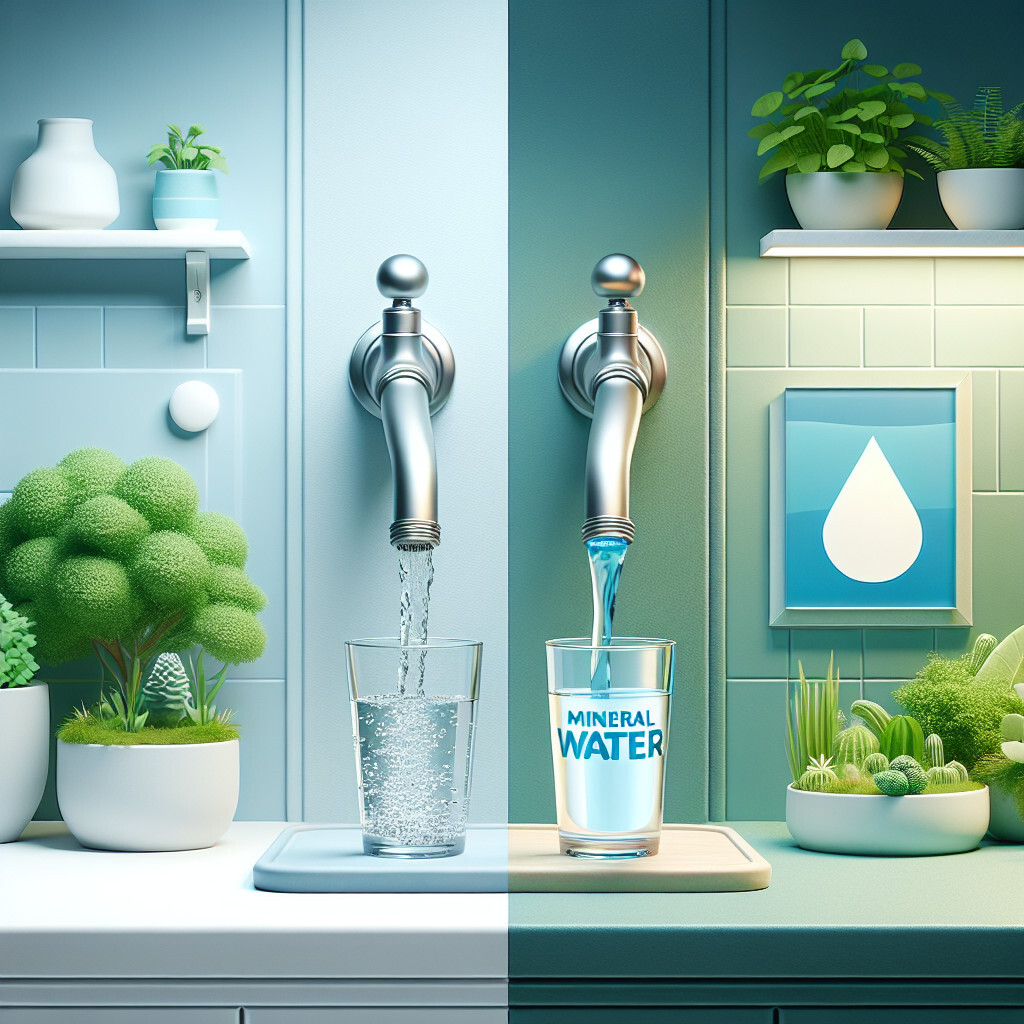-
Table of Contents
- Introduction
- Understanding the Health Implications of Replacing Regular Water with Mineral Water
- Can Mineral Water Serve as a Complete Substitute for Tap Water?
- The Pros and Cons of Using Mineral Water as Your Primary Hydration Source
- Exploring the Sustainability of Replacing Regular Water with Mineral Water
- Q&A
- Conclusion
“Mineral Water: The Refreshing Substitute for Everyday Hydration”
Introduction

Mineral water, a type of bottled water that contains various minerals like salts and sulfur compounds, is often touted for its health benefits. The question of whether it can replace regular water, however, is complex. While mineral water can provide certain nutrients that regular water does not, it is also typically more expensive and may not be necessary for individuals who already maintain a balanced diet. Therefore, while mineral water can serve as a supplement to regular water, it may not be a complete replacement.
Understanding the Health Implications of Replacing Regular Water with Mineral Water
Water is an essential component of life, vital for maintaining overall health and well-being. It is a common belief that drinking water, in any form, is beneficial for the body. However, the question arises, can mineral water replace regular water? To answer this, it is crucial to understand the health implications of replacing regular water with mineral water.
Mineral water, as the name suggests, is rich in various minerals like calcium, magnesium, potassium, and sodium. These minerals are essential for the human body as they play a crucial role in numerous biological functions. For instance, calcium is necessary for bone health, magnesium aids in nerve function, potassium regulates fluid balance, and sodium is vital for muscle contractions. Therefore, drinking mineral water can provide these essential minerals and contribute to the overall nutrient intake.
However, it is important to note that while mineral water is a good source of these minerals, it should not be the sole source. A balanced diet, rich in fruits, vegetables, whole grains, and lean proteins, is necessary to meet the daily recommended intake of these minerals. Relying solely on mineral water for these nutrients may lead to an imbalance, as it may not provide all the necessary nutrients in the required amounts.
Moreover, some brands of mineral water may contain high levels of sodium. While sodium is necessary for the body, excessive intake can lead to high blood pressure and other cardiovascular diseases. Therefore, it is essential to check the sodium content before consuming mineral water regularly.
Another aspect to consider is the pH level of mineral water. Some brands may have a higher pH level, making the water more alkaline. While there is ongoing research about the health benefits of alkaline water, it is generally considered safe to drink. However, excessive consumption may lead to a condition known as metabolic alkalosis, which can cause symptoms like nausea, vomiting, and hand tremors.
Furthermore, the cost of mineral water is significantly higher than regular tap water. While it may be a viable option for those who can afford it, for many, it may not be a sustainable choice. Additionally, the environmental impact of bottled mineral water, due to plastic waste, is another factor to consider.
In conclusion, while mineral water has its benefits, it should not completely replace regular water. It can be a part of a balanced diet, providing additional minerals to the body. However, it is essential to maintain a varied and balanced diet to meet the daily nutrient requirements. Also, it is crucial to consider factors like sodium content, pH level, cost, and environmental impact before making mineral water a regular part of your diet. Therefore, while mineral water can supplement regular water, it should not replace it entirely. Regular water still remains the most accessible, affordable, and sustainable choice for hydration.
Can Mineral Water Serve as a Complete Substitute for Tap Water?
Mineral water, a popular beverage choice for many, is often touted for its health benefits due to the presence of essential minerals such as calcium, magnesium, and potassium. However, the question arises: can mineral water serve as a complete substitute for tap water? This query is particularly relevant in the context of increasing concerns about the quality of tap water in many regions.
Mineral water is derived from natural springs and contains various minerals and trace elements that are beneficial for health. These minerals are naturally occurring and are absorbed by the water as it flows over rocks and through the earth. The composition of mineral water can vary depending on the source, but it generally contains minerals like calcium, magnesium, and potassium, which are essential for maintaining good health.
The primary advantage of mineral water over tap water is its mineral content. These minerals are not only beneficial for health but also contribute to the unique taste of mineral water. For instance, calcium is crucial for bone health, while magnesium plays a vital role in maintaining heart health. Moreover, mineral water is often free from the contaminants that can be found in tap water, such as chlorine and other chemicals used in water treatment processes.
However, while mineral water has its benefits, it is important to note that it cannot completely replace tap water. One of the main reasons is the cost factor. Mineral water is significantly more expensive than tap water, making it an impractical choice for daily use, especially for cooking and cleaning purposes.
Furthermore, the mineral content in mineral water can vary greatly depending on the source. Some brands may not contain sufficient levels of certain essential minerals, while others may contain high levels of minerals like sodium, which can be harmful in excess. Therefore, relying solely on mineral water for your hydration needs may not provide you with a balanced intake of minerals.
Another critical aspect to consider is the environmental impact. The production and transportation of bottled mineral water contribute significantly to carbon emissions and plastic waste. In contrast, tap water has a much lower environmental footprint, as it is delivered directly to homes through an extensive network of pipes.
In terms of safety, tap water in many developed countries is strictly regulated and tested for a range of contaminants. While problems can occur, such as the well-publicized issues in Flint, Michigan, these are generally the exception rather than the rule. On the other hand, while mineral water is also regulated, the standards can vary between countries and even between different brands.
In conclusion, while mineral water has certain health benefits due to its mineral content, it cannot serve as a complete substitute for tap water. The cost, variable mineral content, and environmental impact make it an impractical choice for daily use. Therefore, a balanced approach would be to consume a mix of both tap and mineral water, ensuring a varied and balanced intake of essential minerals while also considering cost and environmental factors.
The Pros and Cons of Using Mineral Water as Your Primary Hydration Source
Mineral water, a popular choice for hydration among health-conscious individuals, is often touted for its potential health benefits. However, the question remains: can mineral water replace regular water as your primary hydration source? To answer this, it is essential to weigh the pros and cons of using mineral water as your primary hydration source.
Mineral water is water from a mineral spring that contains various minerals, such as salts and sulfur compounds. It is often carbonated and can be distinguished from tap water by its distinct taste. The primary advantage of mineral water is its rich mineral content. These minerals, including calcium, magnesium, and potassium, are essential for the human body’s proper functioning. Regular consumption of mineral water can help replenish these minerals in the body, contributing to overall health and well-being.
Moreover, mineral water is often seen as a healthier alternative to sugary drinks and sodas. It can provide a refreshing taste without the added sugars and artificial flavors found in many other beverages. This makes it an excellent choice for those looking to maintain a healthy diet and lifestyle. Furthermore, some studies suggest that drinking mineral water can help improve digestion, reduce the risk of heart disease, and even aid in weight loss.
However, despite these potential benefits, there are also several drawbacks to consider when using mineral water as your primary hydration source. One of the main concerns is the cost. Mineral water is typically more expensive than tap water, which can make it a less practical choice for daily hydration, especially for larger families or those on a tight budget.
Additionally, while the minerals found in mineral water can be beneficial, they can also lead to health problems if consumed in excess. For instance, some brands of mineral water contain high levels of sodium, which can contribute to high blood pressure and other health issues if consumed excessively. Therefore, it’s crucial to check the mineral content of the water before making it your primary hydration source.
Another potential drawback is the environmental impact. The production and transportation of bottled mineral water contribute to carbon emissions, and the plastic bottles themselves often end up in landfills or oceans, causing pollution. In contrast, tap water has a much lower environmental impact, as it requires less energy to produce and does not result in plastic waste.
In conclusion, while mineral water has several potential health benefits, it also has its drawbacks. It can be a good source of essential minerals and a healthier alternative to sugary drinks, but it is also more expensive and has a higher environmental impact than tap water. Therefore, while mineral water can certainly be part of a healthy hydration routine, it may not be practical or necessary to replace regular water entirely. As with many things in life, moderation and balance are key. It’s always a good idea to consult with a healthcare professional before making significant changes to your diet or hydration habits.
Exploring the Sustainability of Replacing Regular Water with Mineral Water
The question of whether mineral water can replace regular water is a complex one, with implications for both personal health and environmental sustainability. This article aims to explore the feasibility and implications of such a replacement, considering factors such as nutritional content, cost, and environmental impact.
Mineral water, as the name suggests, is rich in minerals such as calcium, magnesium, and potassium, which are essential for human health. Regular water, on the other hand, typically contains fewer minerals, depending on its source. From a nutritional standpoint, therefore, mineral water could be considered superior. However, it’s important to note that a balanced diet generally provides all the minerals our bodies need, making the additional minerals in mineral water a bonus rather than a necessity.
Cost is another significant factor to consider. Mineral water is typically more expensive than regular water, especially when purchased in bottled form. This is due to the costs associated with sourcing, bottling, and transporting it. For many people, especially those in lower-income brackets, the cost of mineral water could be prohibitive. In contrast, regular tap water is usually available at a minimal cost, making it a more accessible option for hydration.
The environmental impact of replacing regular water with mineral water is perhaps the most significant consideration. Bottled mineral water has a substantial environmental footprint. The production and disposal of plastic bottles contribute to pollution and climate change, while the transportation of bottled water from source to consumer uses significant energy resources. Furthermore, the extraction of water from natural mineral springs can disrupt local ecosystems.
In contrast, regular tap water has a much lower environmental impact. It is delivered through an infrastructure that, while not without its own environmental costs, is generally more energy-efficient and less polluting than the production and distribution of bottled water. Moreover, tap water is subject to stringent safety regulations, ensuring it is safe to drink.
However, it’s worth noting that the quality of tap water can vary depending on geographical location. In some areas, tap water may be contaminated with pollutants or pathogens, making it unsafe to drink. In such cases, bottled mineral water, or other forms of purified water, may be the only safe option.
In conclusion, while mineral water has certain nutritional advantages over regular water, these benefits must be weighed against the higher cost and environmental impact of mineral water. For most people, a combination of regular water for hydration and a balanced diet for mineral intake is likely to be the most sustainable and cost-effective option. However, in areas where tap water is unsafe, alternative sources of water, including mineral water, are necessary.
Ultimately, the question of whether mineral water can replace regular water is not a simple one. It depends on a variety of factors, including individual nutritional needs, financial resources, and local water quality. As with many issues related to health and sustainability, there is no one-size-fits-all answer. Instead, each person must make an informed decision based on their unique circumstances and priorities.
Q&A
1. Question: Can mineral water replace regular water for daily hydration?
Answer: Yes, mineral water can replace regular water for daily hydration as it contains essential minerals like calcium and magnesium.
2. Question: Can mineral water replace water in cooking?
Answer: Yes, mineral water can be used in cooking, but it may alter the taste of the food due to the minerals present.
3. Question: Can drinking mineral water lead to consuming too many minerals?
Answer: It’s unlikely, but possible. If you drink a lot of mineral water, you may exceed the recommended daily intake of certain minerals.
4. Question: Is mineral water safe to drink every day?
Answer: Yes, it is generally safe to drink mineral water every day, but it’s important to ensure it comes from a safe and certified source.
Conclusion
Mineral water cannot completely replace regular water due to its high mineral content which may not be suitable for everyone, especially those with certain health conditions. However, it can be a good supplement to regular water intake due to its additional health benefits.






